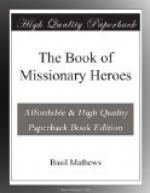“The jam at every bridge was indescribable confusion. Every kind of vehicle that you could imagine—ox carts, buffalo wagons, Red Cross carts, troikas, foorgans like prairie schooners, hay-wagons, Russian phaetons and many others invented and fitted up for the occasion. The animals—donkeys, horses, buffaloes, oxen, cows with their calves, mules and herds of thousands of sheep and goats.”
All through the day they moved on, at the end of the procession—Dr. Shedd, planning out how he could best get his people safely away from the Turks who—he knew—would soon come pursuing them down the plain to the mountains. Night fell and they were in a long line of wagons close to a narrow bridge built by the Russians across the Baranduz river. They had come some eighteen miles from Urumia.
So they lay down in the wagons to try to sleep. But they could not and at two o’clock in the night they moved on, crossed the river and drove on for hour after hour toward the mountains that rose in a wall before them.
The poor horses were not strong so the wagon had to be lightened. Assyrian boys took loads on their heads and trudged up the rocky mountain road while the wagon jolted and groaned as it bumped its way along. The trail of the mountain pass was littered with samovars (tea urns), copper kettles, carpets, bedding; and here and there the body of someone who had died on the way. At the very top of the pass lay a baby thrown aside there and just drawing its last breath.
So for two days they jolted on hardly getting an hour’s sleep. At last at midday on the third day they left Hadarabad at the south end of Lake Urumia. Two hours later the sound of booming guns was heard. A horseman galloped up.
“The Turks are in Hadarabad,” he said. “They are attacking the rear of the procession.”
“It seemed,” said Mrs. Shedd, “as if at any moment we should hear the screams of those behind, as the enemy fell upon them.”
The wagons hurried on to the next town called Memetyar and there Dr. Shedd waited, lightening his own wagons by throwing away everything that they could spare—oil, potatoes, charcoal, every box except his Bible and a small volume of Browning’s Poems.
Then they started again, along a road that was littered with the discarded goods of the people. Then they saw on the road-side a little baby girl that had been left by her parents. She was not a year old and sat there all alone in a desolate spot. Left to die. Dr. Shedd looked at his wife and she at him.
He pulled up the horse and jumped down, picked up the baby and put her in the wagon. They went along till they came to a large village. Here they found a Kurdish mother.
“Take care of this little girl till we come back,” said Dr. Shedd, “and here is some money for looking after her. We will give you more when we come back if she is well looked after.”




